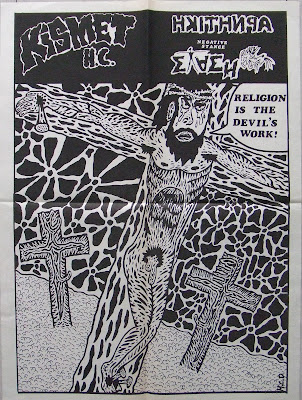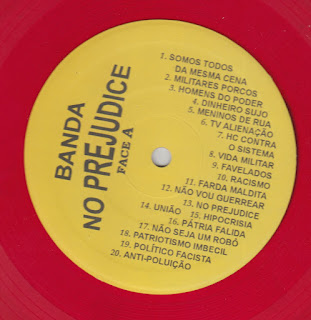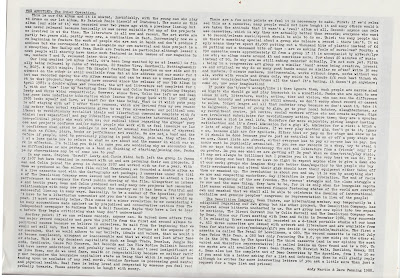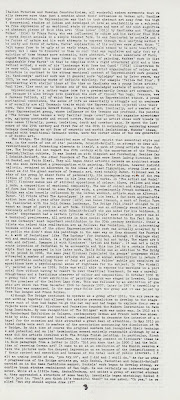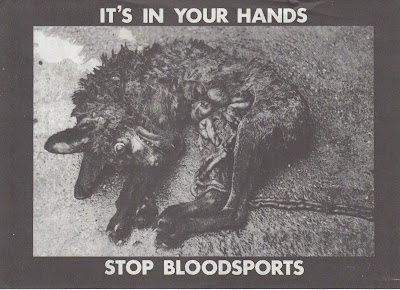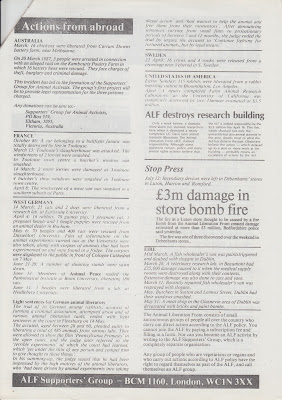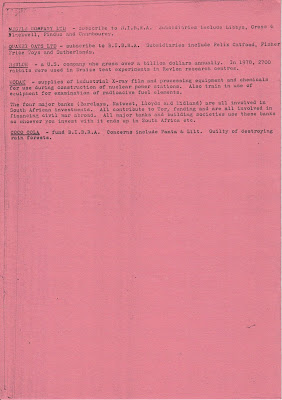My mate Paul often says that doubt is the origin of wisdom, which is pretty sensible. But he also argues that reptilians once raided his weed stash so I suppose it is safe to examine his philosophical stance in context. Can Love is our Strongest Weapon, beside sounding like an R&B song recorded for a charity against world hunger, be considered as an anarchopunk release as far as the 80's legacy goes? In terms of politics and aesthetics, the split Lp is without a doubt a relevant anarchopunk record but, in a series that focuses on those 90's works that specifically built on the foundational sound of the original anarcho waves, does it belong? What would Paul do (or smoke)?
I realize such intellectual hair-splitting considerations may look very trivial but, in my quest to be viewed as sophisticated, they have become the basis, if not the raison d'être, of Terminal Sound Nuisance. Reflecting on records or bands few people give a fuck about (I could be wrong about this one but I very much doubt it) and on how they fit or don't fit with certain pre-defined categories, how they challenge them or on the contrary embrace them and how such processes are intentional or unintentional. But yeah I offer lossless files and clean scans for printing shirts for your Etsy shop as well. Of course, aforementioned questions are meaningful in retrospect when it comes to 90's bands, a time when bands did not try to replicate specific schools or bands quite as much (the then novelty d-beat wave being a crucial exception musically but not conceptually). You had bands influenced by Wretched, but not bands who thrived to sound just like Wretched. Throughout the series, we saw that bands like Counter-Attack or Wlochaty certainly loved Conflict to death and a large part of their sound relied on their musical and structural influence but they did not sound "just like" Conflict. The question remains: how influenced by the original anarchopunk wave were Kismet HC and Αρνητική Στάση/Arniki Stasi? Alright, you can think about it for a couple of days before reading what's next.
Kismet HC, from Stoke-on-Trent (yes, just like...), is a band that I have known for a very long time. For some reason I cannot quite remember how I was able to get hold of a copy of their very strong cd-only 2001 album Our Message is of Anger... Our Voices are of Pain (I may have ordered it from Active Distribution). I have to admit that I absolutely loved (and I still do as a matter of fact) the title of the album although I seem to remember reading that it was not the original choice of the band and that one of the labels basically decided for them. Some animosity was involved. Perhaps one of the labels was run by a reptilian, who knows? In any case, that album is brilliant (if you have not heard it, imagine top notch female-fronted unhinged anarcho hardcore thrash with plenty of energy and versatility, quite original) and I really got into them and was even able to see them live in Manchester in 2004 (I think). While KH are often associated with the frantic, powerful vocals of Zanne, she only joined the band afterwards. In 1991 the vocals were shared between Fluff and Dave (I think? So many unanswered questions, so many...), providing the music with a vintage classic dual vocal hardcore attack. Their side of the split indicated to an extent what they would eventually become, 10 years after (why such a break between records? Yet another question...), but you could almost argue that 1991's KH and 2001's KH were two different bands and today we are going to focus, with determination, dexterously, perilously even (I may fall off my chair and injure meself like that one time I dozed off during math class), on the early period of the band and see how close they were to the traditional anarchopunk sound.
Well, their side does open with a poem entitled "Piggy overdose" about animal exploitation and the production of meat so that definitely sets the tone in terms of politics and of course these are issues that are inherent to classic anarchopunk and have even almost become synonymous with it. After all, having an animal rights number for an anarcho band was pretty much compulsory up until the mid/late noughties. Failure to provide a specimen could result in the members having their anarchopunk membership cards cancelled and, worse, being exposed as posers in public. We don't have such problems nowadays, fortunately. Just post a picture of yourself with a vegan cupcake on Insta with the proper trendy # and you're good to go. Why even bother mentioning animal rights in a song anymore now that we have Beyond Meat and get vegan food at the supermarket? Vegan sausages were the ultimate goal, right?
Like the poem and some spoken parts, there are other softer, tuneful moments in the music reminiscent of the 80's school, like the Omega Tribe-ish opening of the brilliant "Honour Mother Earth" but on the whole KH was very much a high energy post-anarcho hardcore thrash band. They kept the politics and the fierce DIY non-profit of anarchopunk but were first and foremost a hardcore band musically (such a comment applies to most of the early crust bands). I see the first era of KH in the same light as other late 80's British fast anarcho hardcore like Generic, Electro Hippies and Active Minds in terms of creative intent to which you could add a healthy slice of late Anti-System and filthy spoonfuls of Mortal Terror. Raw and direct snotty hardcore. I really like the energy and the drive and unsurprisingly, what with me being a sucker for early Britcrust and UK hardcore, I think the music is bloody brilliant and makes the heart beat. Undeniably, it is more relevant to think of 1991's KH as a powerful illustration of the classic mid/late 80's UK hardcore sound rather than a draft of what they would be doing 10 years later. Very good and rather unappreciated.
The other side of Love is our Strongest Weapon comes from Athens, Greece, with the band Αρνητική Στάση/Arniki Stasi. If you have already read my glorious prose on the blog, you will have noticed, quite certainly, that I dearly enjoy the specific brand of dark punk-rock that Greece has produced since the 80's. I even made an introductory compilation if you are interested (and you should be, knowledge of the classic Greek punk sound could help you triumph over your opponents on trivia nights). Like most people outside of Greece - beside initial followers of KH I presume - I first heard of Αρνητική Στάση through their connection to Profane Existence with whom they worked on the release of the Spectators of Decadence Ep in 1993. I distinctly remember getting the 15-year anniversary issue of Profane Existence in 2004 that included a retrospective compilation that had ΑΣ among many other bands that I was not familiar with at the time like One By One or State of Fear. The Greeks did not really sound like the other bands on the compilation (they kinda stuck out, almost as much as Karma Sutra) but their song was anthemic, dynamic and had a cracking chorus. And well, they were from Greece, that was very unusual for me at the time and the peculiar tonalities and flow of the language were challenging but also memorable and enticing. Different but good, I craved for more, the polar opposite of the time I first heard ethereal shoegaze and I ended up vomiting in the paper bin because there was already someone in the toilets. That the ΑΣ Ep is nowhere to be found on its own on youtube is ridiculous.
As I progressively grew into a maniacal Greek crust fan (one of my favourite sub-sub-subgenres), my focus shifted toward ΑΣ's classic 1993 album Άγγελοι Του Ψεύδους, a work that blended the heavy metallic Greek crust sound with the classic dark punk sound, not unlike an orgy between Ολέθριο Ρήγμα/Olethrio Rigma, Ναυτία/Naytia and Γενιά Του Χάους/Genia Toy Xaoys. It is a great inventive album that does not totally fit into preconceived categories and it comes highly recommended if you are into 90's hardcore punk. This split Lp is totally crust-free on AE's side and their progression between 1990 and 1993 is impressive. At the start of the decade, ΑΣ epitomised what Greek dark punk is all about: melancholy but energetic, desperate but bellicose, suicidal but fighting to live, deceptively simple, always on the verge of crashing, catchy and tuneful but not really melodic, it just has a specific feel. On this side, they excel at using all the songwriting tricks popularized by Γενιά Του Χάους, Ex-Humans or Γκούλαγκ/Gulag with a simple clear sound and production, almost minimal at times but the intensity and sincerity emanating from the songs themselves are enough. ΑΣ jump from psychedelic rock, to moody mid-paced anarcho-tinged punk, fast hardcore punk or depressed, trippy yet raging dark punk and yet it never sounds like a random aggregate of songs, they really work and flow together in a very natural fashion and the overall trippy atmosphere and sonorities help the songs coalesce and echo with each other. ΑΣ are hypnotic on this record. A full discography of the band was released last year so you know what to do.
In terms of lyrics, ΑΣ was a political animal with words about fighting back against the police, resisting oppression and even an animal rights number. So they were clearly an anarchist dark punk band but assessing the influence of the early UK anarcho wave on their songwriting (or on Greek punk in general) is trickier. In addition the obvious local culprits, without context, you could definitely find parallels with British bands like The Mob, Conflict even, Karma Sutra, Two Fingered Approach or Null & Void. It could just be out of a common mood and similar desires and ways to express things rather than a conscious decision to use such influences to create your language. It could be neither or, maybe more likely, it could be both. The Greek style is not identical to its British counterpart, there are other influences going on and meeting and merging with one another, it easily stands on its own two feet, but to my ears the connections in terms of mood and content and atmosphere are obvious. They are like cousins if you like. That Bluurg Records released Ex-Humans' demo tape in 1984 cannot have been a coincidence.
Love is our Strongest Weapon is classic because KH and ΑΣ both exemplified a specific time, place and genre and original because such a pairing was unique and the combination of a British anarcho hardcore thrash band with an angry hypnotic Greek dark punk makes a lot of sense. It is meaningful and it offers a wide array of emotions and vibes while the two bands share essential common beliefs. The cover is unusual. I'm being diplomatic here as the first thing you notice is that there is a mulleted hippie with his cock out right in the middle. It is not badly executed as the psychedelic shroomy aesthetics are not irrelevant considering the bands and you still have the reassuring figures of a nazi police officer and a crazy vivisector to indicate that it is indeed an anarchopunk record. In fact, I quite like it. But still: cock out. The Lp also comes with a poster depicting an angry-looking crucified Jesus... with his cock out! And there are two other crucified cocks, fully erect, in the background. The artist responsible for the poster is one Mike Diana who was apparently the first artist to receive a criminal conviction for obscenity in the U$ of A. Thanks for that Wikipedia.
A delightful minor classic.






